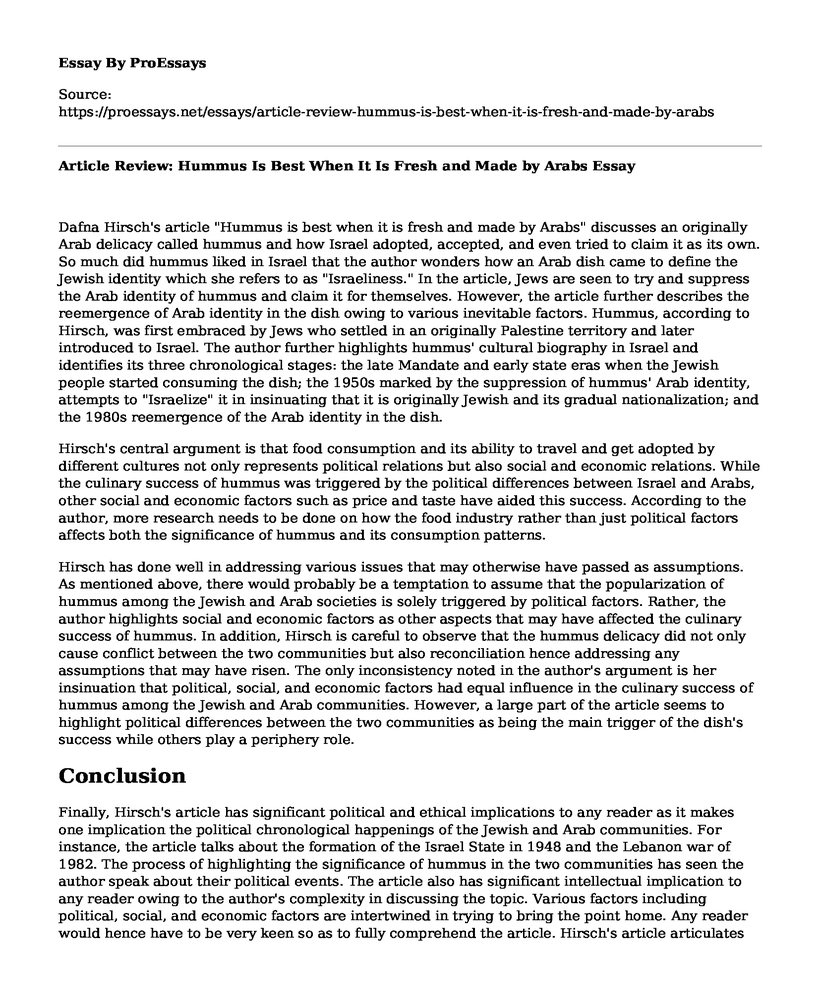Dafna Hirsch's article "Hummus is best when it is fresh and made by Arabs" discusses an originally Arab delicacy called hummus and how Israel adopted, accepted, and even tried to claim it as its own. So much did hummus liked in Israel that the author wonders how an Arab dish came to define the Jewish identity which she refers to as "Israeliness." In the article, Jews are seen to try and suppress the Arab identity of hummus and claim it for themselves. However, the article further describes the reemergence of Arab identity in the dish owing to various inevitable factors. Hummus, according to Hirsch, was first embraced by Jews who settled in an originally Palestine territory and later introduced to Israel. The author further highlights hummus' cultural biography in Israel and identifies its three chronological stages: the late Mandate and early state eras when the Jewish people started consuming the dish; the 1950s marked by the suppression of hummus' Arab identity, attempts to "Israelize" it in insinuating that it is originally Jewish and its gradual nationalization; and the 1980s reemergence of the Arab identity in the dish.
Hirsch's central argument is that food consumption and its ability to travel and get adopted by different cultures not only represents political relations but also social and economic relations. While the culinary success of hummus was triggered by the political differences between Israel and Arabs, other social and economic factors such as price and taste have aided this success. According to the author, more research needs to be done on how the food industry rather than just political factors affects both the significance of hummus and its consumption patterns.
Hirsch has done well in addressing various issues that may otherwise have passed as assumptions. As mentioned above, there would probably be a temptation to assume that the popularization of hummus among the Jewish and Arab societies is solely triggered by political factors. Rather, the author highlights social and economic factors as other aspects that may have affected the culinary success of hummus. In addition, Hirsch is careful to observe that the hummus delicacy did not only cause conflict between the two communities but also reconciliation hence addressing any assumptions that may have risen. The only inconsistency noted in the author's argument is her insinuation that political, social, and economic factors had equal influence in the culinary success of hummus among the Jewish and Arab communities. However, a large part of the article seems to highlight political differences between the two communities as being the main trigger of the dish's success while others play a periphery role.
Conclusion
Finally, Hirsch's article has significant political and ethical implications to any reader as it makes one implication the political chronological happenings of the Jewish and Arab communities. For instance, the article talks about the formation of the Israel State in 1948 and the Lebanon war of 1982. The process of highlighting the significance of hummus in the two communities has seen the author speak about their political events. The article also has significant intellectual implication to any reader owing to the author's complexity in discussing the topic. Various factors including political, social, and economic factors are intertwined in trying to bring the point home. Any reader would hence have to be very keen so as to fully comprehend the article. Hirsch's article articulates with other class reading in the sense that both require careful analysis in order to comprehend them.
Cite this page
Article Review: Hummus Is Best When It Is Fresh and Made by Arabs. (2022, May 09). Retrieved from https://proessays.net/essays/article-review-hummus-is-best-when-it-is-fresh-and-made-by-arabs
If you are the original author of this essay and no longer wish to have it published on the ProEssays website, please click below to request its removal:
- Essay on Breakdown of Lipids (Triglycerides) into ATP
- How to Prepare Cookie - Process Analysis Essay
- A Proposed Solution to Artificial Food Additives Paper Example
- Essay Example on Fairtrade Social Movement: Securing a Better Future for Coffee Farmers
- Essay Example on Achieving Healthy Living: Exercise & Healthy Eating
- Essay Example on Eating Meat: Is It Ethical to Enjoy Animal Pain?
- Essay Sample on Healthy Diets: Impact of Fast Food & Movie Perspectives







